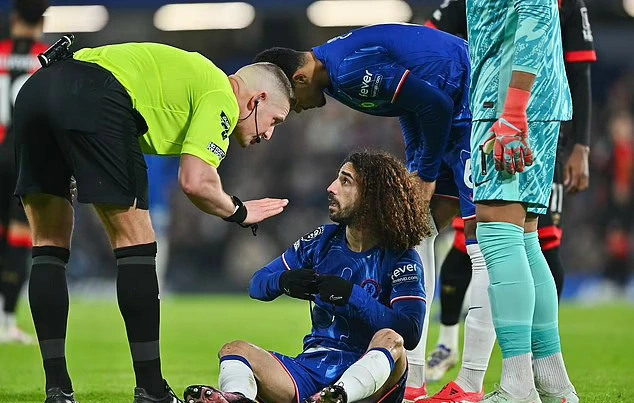Controversy erupted at Stamford Bridge on Tuesday when referee Robert Jones became the first Premier League official to reject a potential red card after a pitch-side review, following a cryptic message from VAR Graham Scott.
The incident left Chelsea fans outraged and further fueled debate about VAR’s impact on key decisions.
During the 1-1 draw between Chelsea and Bournemouth, Jones faced a pivotal moment when David Brooks appeared to pull Marc Cucurella’s hair while contesting for the ball. As tensions mounted and Stamford Bridge roared for justice, Scott summoned Jones to the monitor to reassess the altercation. Despite what seemed to be clear evidence of Brooks grabbing Cucurella’s hair, Jones opted for a yellow card instead of a red, a decision that baffled many.
The phrase that sparked intrigue was Scott’s comment, “It’s in your gift.” This wording, while unfamiliar to most fans, is part of standard refereeing terminology. Refereeing sources have clarified that it refers to situations where all possible outcomes—no action, a yellow card, or a red card—are available to the match official, leaving the final call entirely in their hands.
Advertisement
Latest Press Conference
We’re on Social Media



Chelsea boss Enzo Maresca did not hide his frustration during the post-match press conference, criticizing the inconsistency in decision-making. The hair-pulling incident was reminiscent of a similar controversy involving Cucurella last season, further igniting the Blues’ grievances with VAR.
PGMOL, the body responsible for Premier League referees, may include this incident in its next episode of Match Officials Mic’d Up, a show hosted by Howard Webb. The program aims to increase transparency by revealing the audio exchanges between referees and VAR officials. If featured, fans would gain rare insight into the decision-making process behind one of the season’s most contentious moments.
The timing of the incident proved crucial. After Brooks avoided dismissal, Bournemouth capitalized by taking a 2-1 lead. However, Reece James salvaged a point for Chelsea with a stunning 25-yard free-kick deep into stoppage time, rescuing the Blues from defeat but leaving a lingering sense of injustice.
Calls for Greater Consistency and Robert Jones Case
This incident has reignited calls for greater consistency and clarity in the use of VAR. Critics argue that the subjective nature of decisions involving physical contact, such as hair-pulling, undermines the technology’s intended purpose. The phrase “ghosting”—another term in referees’ unique lexicon—describes the precise moment when a player makes contact with the ball, highlighting the complex language officials use to communicate quickly and efficiently.
As debate continues, it remains to be seen whether Webb and the PGMOL will stand by Jones’ interpretation or deem the yellow card insufficient punishment. The decision has already sparked widespread discussion on social media, with fans and pundits dissecting every frame of the incident.
Chelsea supporters feel particularly aggrieved given their team’s recent history with contentious VAR decisions. The frustration is compounded by the stakes involved in a tightly contested Premier League season where every point matters.
Human Interpretation
While VAR was introduced to eliminate clear and obvious errors, the subjective nature of incidents like this one shows that human interpretation remains central to football officiating. The use of phrases like “It’s in your gift” highlights the balance between technological assistance and the referee’s ultimate authority on the pitch.
The coming days will likely bring further scrutiny and debate. Fans await potential explanations from the PGMOL, hoping for clarity on whether Brooks’ hair pull should have warranted a different outcome. Meanwhile, Chelsea will need to regroup quickly as they push forward in their Premier League campaign, with this latest controversy fresh in their minds.
For Robert Jones, this episode marks a historic moment in Premier League refereeing—but one that may be remembered more for its controversy than its clarity.
